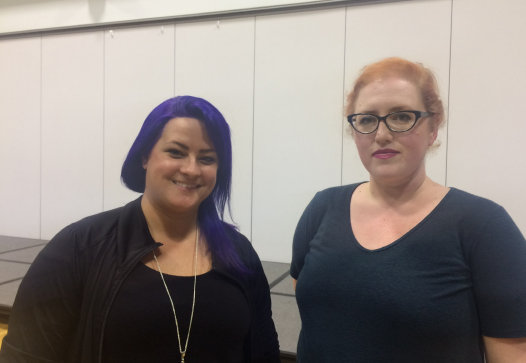Pro-life and feminist: lately, these two words seem inherently opposed to each other.
On Monday night in the Center for Global Citizenship, New Wave Feminists Destiny Delarosa and Kristen Walker Hatten came to SLU to argue against that very idea. The two women identify as both feminists and as pro-life activists.
Hatten and Delarosa were invited by SLU Students for Life President Betsy Daly, who emphasized her desire to bring intersectional speakers to campus in the hopes that their multifaceted views might apply to a wider audience than Students for Life alone. Daly mentioned her desire to focus on more than just abortion:
“We try to make our protection of life all-around,” Daly said. “We take a stance against all attacks on life – especially on abortion, the death penalty, physician-assisted suicide or euthanasia, poverty and violence. If we say we’re pro-life then we have to be for the whole human person throughout the entire life span. We try to be a very compassionate base rather than just shouting ‘This is right!’”
Hatten and Delarosa’s presentation focused largely on what they see as key issues within both the current feminist movement and the current pro-life movement. Much of what they said addressed the necessity of the pro-life movement to become a women’s movement as well.
“We’re trying to rebrand the movement,” Delarosa said. “It has to become a movement that is woman-centered. It has to become about empowering women. That’s how we’re going to stop abortion. The pro-choice side is all about saying ‘You can’t do this. You’re not strong enough,’ and the pro-life side needs to become more about ‘You can do this, you are absolutely strong enough, and we will be there to help you help yourself. We want to spread this message of courage, of being a hero. Maybe you didn’t plan this pregnancy, but you have a chance to save a life now.”
“I want the same rebranding for feminism that the pro-life movement needs,” said Hatten. “It seems like feminism has become synonymous with women’s healthcare, which has become synonymous with abortion. And it’s so much bigger than that.”
The two shared their personal testimonies about what led them to become pro-life activists.
Delarosa was the child of an accidental pregnancy and is the mother of a son born under those circumstances as well. Hatten spoke of her extremely pro-choice leaning views in the past and how a close friend of hers changed her own views on the matter and altered Hatten’s own thoughts on abortion through thoughtful discussion of ethics and medical science rather than by religious attack.
Daly agreed and spoke of her desire to see a change in the way people view the relationship of the fetus to the body of the mother.
“I think that there has to be a realization that the child is in the mother; the child is not part of the mother,” Daly argued.
“The child is just as important as the woman. But ‘just as important as the woman’ means that the woman is important. Both are very, very important. An abortion places the woman above the child, but only caring about banning abortion makes only the child important. I think the pro-life movement needs to improve in that regard, being pro-baby, pro-woman, pro-life.”
Delarosa and Hatten said that they have faced minimal opposition for their stance. They have never had a protestor at one of their events. According to Hatten, most people have been happy to hear a fresh perspective that takes social justice and feminism into account.
Not all students were convinced, however. “On a personal point, because of religion, I am pro-life, [but] I do not believe there are sustainable arguments for policy,” said attendee Daniela Feliciano.
“I truly believe in women having the option, in women having the agency to do whatever they think is best with and for their bodies. I believe my role is to create prevention resources so that abortion is not necessary in the first place.”
Feliciano also said that she felt the presentation was not intersectional and came across as one-dimensional. “The speaker had a slut-shaming approach to pro-life which I do not agree with,” Feliciano said.
During the presentation, Hatten and Delarosa challenged the idea that powerful female icons such as Beyoncé do more harm than good by emphasizing their sexuality as part of what makes them valuable.
Hatten and Delarosa plan on attending the March for Life this January and said they would be live on social media for anyone interested in following them.











A.D • Oct 28, 2016 at 6:53 pm
“That’s how we’re going to stop abortion. The pro-choice side is all about saying ‘You can’t do this. You’re not strong enough,’”…
1. It’s embarrassing to hear these women claim they can “stop” abortion. Women have been seeking out, and giving themselves abortions since the beginning of time. There’s no such thing as abolishing the practice of abortion, newsflash. What you CAN do is help PREVENT it, by emphasizing the need to abolish abstinence-only education (which leads to high rates of STDs and teen pregnancies), by putting pressure on policy-makers to ensure easier access to all forms of birth control, and by championing a national paid family leave law that doesn’t force certain women to choose between motherhood and career. The pro life movement would be far better off putting money, resources and political power into the lives of the LIVING children, including the near half a million kids in foster care, as well as the children living in poverty (the US has one of the highest rates of child poverty in the world). These two women claim they are doing it, but this article didn’t go into enough depth to show how they are doing, or the impact of their supposed activism.
2. To claim pro choice feminists have a “you can’t do this” attitude is heinously offensive. It shows just how non-feminist these women are, and it is also clear this pair are simply co-opting the “feminist” label to present themselves in a more digestible way. Not buying it, ladies. You don’t get to tout yourself as a feminist by dissing other women, including Beyonce, as stated in the article. That’s called slut-shaming! These women would be better off just falling in line with the rest of the inconsistent, hypocritical pro life activists who like to blame feminism for certain things, not realizing that their freedom to vote, be paid equally, own property, own a bank account and be an activist is thanks to the women’s rights/feminist movements.
Destiny • Oct 28, 2016 at 9:30 am
Great article, Kristina!
Thanks for coving our talk. I did want to mention that my issue with Beyoncé has nothing to with her sexuality. I’m all for women having agency. The issue is with the commodification of our sexuality (and in Bey’s case, also the word “Feminism”) to sell albums. Commercializing sexuality is what I have a problem with, not sexuality itself.
Just wanted to clarify. Again, thanks for writing a very fair piece.